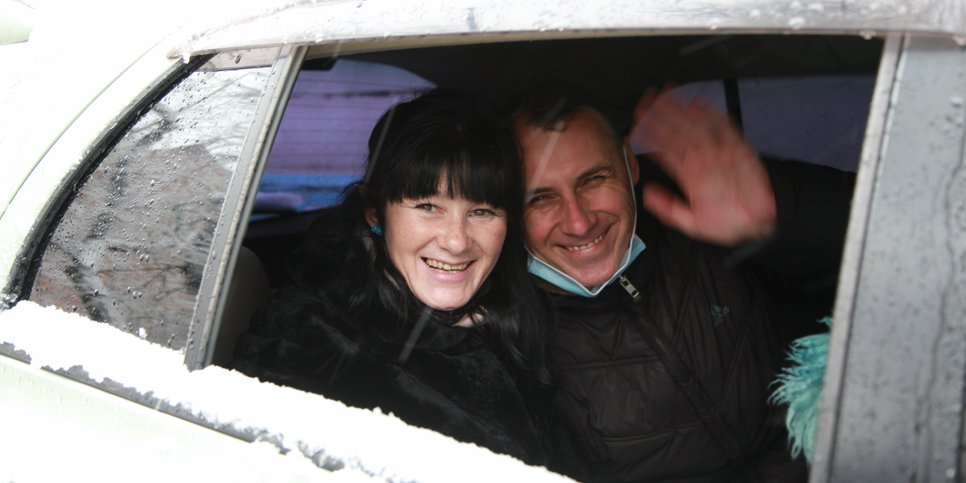In the photo: Dmitry Barmakin with his wife, Elena, after the announcement of the acquittal
In the photo: Dmitry Barmakin with his wife, Elena, after the announcement of the acquittal
The First Acquittal of One of Jehovah's Witnesses Under Article 282.2 of the Russian Criminal Code in Vladivostok
Primorye TerritoryOn 22 November 2021 in Vladivostok, following the explanations of the Plenum of the Supreme Court of the RF, an unprecedented event took place: after a continuous chain of convictions of Jehovah's Witnesses Dmitriy Barmakin was found not guilty under part 1 of article 282.2 of the RF Criminal Code and acquitted by the court with the right to rehabilitation.
Judge Stanislav Salnikov of the Pervorechenskiy District Court in Vladivostok handed down the acquittal verdict. The text of the verdict echoes a recent explanation by the Plenum of the Supreme Court. The verdict notes: "The Court, having considered the present case, is convinced that both for every person in general and for everyone of Jehovah's Witnesses, attending joint worship services, providing premises for them, reading and discussing religious literature, spreading religious beliefs, observing religious rites and ceremonies, singing spiritual songs, offering prayers are forms of lawful conduct which are part of freedom of conscience and freedom of religion. . . . Conducting religious rites of Jehovah's Witnesses in residential or commercial premises... does not violate the law, but is the implementation of the rights of believers to freedom of conscience and religion, because such a right cannot be limited exclusively to the space of private life, it can also be implemented in the external sphere, including in mass collective forms."
In addition, the verdict says that Barmakin "is subject to acquittal due to the absence of corpus delicti in the defendant's act," since the believers "exercised the right to freedom of religion enshrined in the Russian Constitution." Judge Salnikov noted: "When proceeding in criminal cases on crimes of an extremist nature, which include Article 282.2 of the Criminal Code of the Russian Federation, it must be borne in mind that ... the motives for committing these offences shall be proved ... Such motives have not been proven in the case. [...] Rights related to freedom of religion should be ensured regardless of whether a person is a member of any religious organization or not, and therefore the right to profess the religion of Jehovah's Witnesses should be ensured even after the decision of the Supreme Court of Russia of 20.04.2017. After examining the evidence presented by the investigation, the court concluded that "Barmakin D.V. never carried out extremist activities, he professed the religion of Jehovah's Witnesses, including meeting and discussing his beliefs with fellow believers."
Significantly, the court noted that "the ideology of the Jehovah's Witnesses religion is not recognized as extremist in Russia," and "the Bible... [its] content and quotations cannot be recognized as extremist materials."
Dmitriy Barmakin and his wife, Yelena, moved from Crimea to Vladivostok to take care of their elderly mother-in-law. On the morning of July 28, 2018, armed law enforcement officers in masks burst into the house of a 90-year-old woman, where the Barmakins were staying. They detained the believer, accusing him of organizing the activities of an organization banned by the court. The court sent him to a pre-trial detention center, where he spent 15 months, the first 2.5 months in a damp basement cell with rats and insects. Nevertheless, Dmitriy Barmakin categorically refused to plead guilty to the charges. After his release from jail Barmakin spent more than two years under prohibition of certain actions, namely, to change his place of residence, contact a number of people, receive mail and use means of communication.
The case was managed by the Investigative Committee of Russia in the Pervorechensky District of Vladivostok. The key witness for the prosecution in the case was 30-year-old local resident Ekaterina Petrova, a teacher at the Primorye Energy College in Vladivostok. Pretending to be interested in the Bible, she met with believers and asked them questions about their faith in God. It was later revealed that she was conducting covert audio recording on assignment from the security services.
In August 2019, Barmakin's wife, Yelena, also faced criminal prosecution. A criminal case was also opened against her for "extremism". Later, nine more peaceful believers became defendants in this case.
"Of course, it is not easy to be the first judge to interrupt a continuous chain of guilty verdicts and deliver a verdict of acquittal. We are grateful to Judge Stanislav Salnikov for his strength and his sound approach to the case. We hope that all Russian courts in their decisions on cases involving Jehovah's Witnesses will be guided by the decision of the Plenum of the Russian Supreme Court," commented Yaroslav Sivulskiy, a spokesman for the European Association of Jehovah's Witnesses, on the verdict for Barmakin and added: "The verdict stressed what Jehovah's Witnesses were trying to make clear in all these years of religious persecution in Russia: religious activity by its very nature cannot be a threat to society or the state in any other way. I would like to believe that this verdict is only the first of many decisions in similar cases."
Dr. Sergey Ivanenko, a religious scholar, analyzed the situation with Jehovah's Witnesses in Russia and concluded: "Having found themselves on trial, Jehovah's Witnesses do not consider themselves guilty and have no intention of abandoning their religious beliefs... Remaining Jehovah's Witnesses, they do not consider themselves criminals. Moreover Article 28 of the Constitution of the Russian Federation "guarantees everyone freedom of conscience, freedom of religion, including the right to profess individually or collectively any religion or not to profess any, to freely choose, have and disseminate religious and other beliefs and to act in accordance with them."

